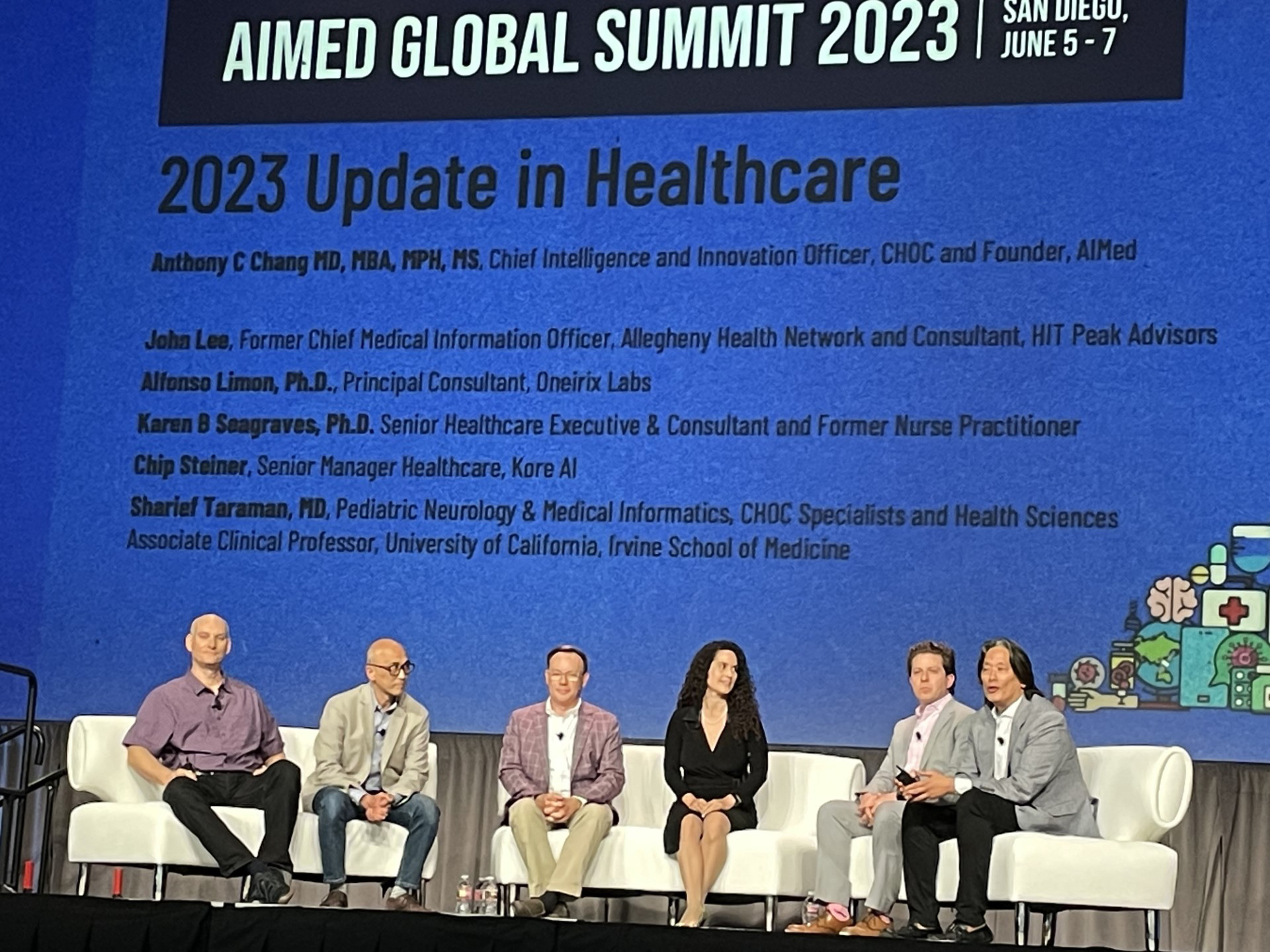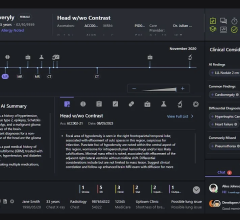
During the AIMed 2023 Summit, a panel of experts shared their personal perspective on what’s happening in artificial intelligence (AI), particularly with ChatGPT, and where they think these advances are going, in a panel discussion titled AI Foundations: 2023 Update of AI in Healthcare.
The panel included Alfonso Limon, PhD, principal consultant/healthcare and AI, at Oneirix Labs; Karen B. Seagraves, PhD, MPH, NEA-BC, senior healthcare consultant and former vice president of Atrium Health’s Neuroscience Institute; Sharief Taraman, MD, DABPN, DABPM FAAP, chief executive officer at Cognoa, Inc. and associate health sciences professor/pediatrics, University of California, Irvine School of Medicine; Chip Steiner, product manager for healthcare at Kore.ai; and John Lee, MD, former chief medical information officer, Allegheny Health Network. Anthony Chang, MD, MPH, MS, MBA, chairman and founder of AIMed, who is also the director of the Medical Intelligence and Innovation Institute (MI3), served as moderator.
What’s your personal perspective on what’s happening in AI, particularly with ChatGPT, and where you think these advances are going?
“These large language models are just starting to really engage in bringing people forward to really understand and appreciate that they have the potential to change our world for the better. I’m inspired by this.”
—Sharief Taraman, MD, DABPN, DABPM, FAAP, chief executive officer at Cognoa, Inc. and associate health sciences professor/pediatrics, University of California, Irvine School of Medicine
“As with anything else, what I’m hearing is that I don’t know if they trust it. There’s hope, but there’s a lot of caution. There is also a lot of skepticism.”
—Karen B. Seagraves, PhD, MPH, NEA-BC, senior healthcare consultant and former vice president of Atrium Health’s Neuroscience Institute
“When I think about the connection that we as humans have to machines, and artificial intelligence is thrown around, it immediately evokes apprehension. Conversation with machines is the way to bridge that gap and lower the apprehension.”
—Chip Steiner, product manager for healthcare at Kore.ai
“It’s an interesting curiosity. I don’t think people truly understand what the impact potentially could be. And that brings me, as a clinical informaticist, to a point where I want to help change that. I want to help direct this really, really powerful tool — this, for lack of a better word, unguided missile, and bring it to focus and bring to bear the tools that actually make the most impact, and doesn’t cause a lot of extra collateral damage, because I think it will happen. There will be a lot of fits and starts, and I think we need to bring some focus on use cases that will actually work, and then get people to start understanding.”
—John Lee, MD, former Chief medical information officer, Allegheny Health Network
There has been a surprising level of excitement and even a sort of viral explosion of discussions around the use of ChatGPT, even though it has been around for a few years now. How do you explain this? And where do you think we’re going to go from here?
“Usually, the way that we communicate with algorithms is to ask them to provide us a number, a category of some object. And based on that, we have to think and reason about them. The beautiful thing about this technology is for the first time, we can ask it questions, we can probe the way that it has developed a sense of its environment. And that is fundamentally different than anything we’ve had so far, and that’s extremely exciting, especially in orchestration. How do we use this tool to call up on other tools that don’t have this ability? I think it’s a fundamental change.”
—Alfonso Limon, PhD, principal consultant/healthcare and AI, at Oneirix Labs
“Glass.health, or glass AI, is a large language model that we were using for actually teaching cases to the residents and med students. I think that it has been pretty interesting, and I think in a way it’s also inspirational because it gives you things that you maybe didn’t think about, or encourages the students to think differently. We are actually starting to try and experiment using it as a teaching tool.”
—Sharief Taraman, MD, DABPN, DABPM, FAAB, chief executive officer at Cognoa, Inc. and associate health sciences professor/pediatrics, University of California, Irvine School of Medicine
“I think people are afraid that as AI gets smarter and as GPT gets smarter, people get dumber. So I would recommend that it is not a replacement for learning. It is not a replacement for study. It is not a substitute for preparation. I would encourage people to allow it to use parts of their mind that they didn’t access. In other words, know everything that you know, and then go and ask the question. Either it’s going to confirm, or it’s going to give you things you didn’t think about.”
—Karen B. Seagraves, PhD, MPH, NEA-BC, senior healthcare consultant and former vice president of Atrium Health’s Neuroscience Institute
“When you’re having a conversation with another human, you take a lot of cues from the interaction, and you appreciate when the person you’re speaking with appears to be following along in your conversation. You develop a sense of engagement. We don’t typically have that if your interface is a textbox of some sort. So, what we like to use these types of generative AI tools for is to organize thoughts, reduce some of the tedium, and present a conversation that suggests you’re following that they’re adding humanistic to a machine, but that the machine is paying attention. It’s following along in the conversation; it’s adding to the conversation. And in my experience, that lowers the apprehension that you’re maybe talking to just a mechanical object — that you are developing almost a rapport, although it’s not a humanistic rapport. It is reducing tedium by organizing information and presenting it in a conversational tone.”
—Chip Steiner, product manager for healthcare at Kore.ai
Make a prediction about what’s going to happen in the next 12 months or so.
“You will be using your voice much more than your thumbs.”
—Chip Steiner, product manager for healthcare at Kore-ai
“I think you are going to have more buy in from healthcare administrators who are willing to purchase the technology, because they are going to get pressure from the folks in a room like this. So, I think I just caution everyone to make sure that you are going to make sure they get what they pay for.”
—Karen B. Seagraves, PhD, MPH, NEA-BC, senior healthcare consultant and former vice president of Atrium Health’s Neuroscience Institute
“Automation and connectivity are going to free up our nurses and our doctors and physical therapists and everyone to be more involved in AI. But I think AI is going to uncover a lot more of the challenges that we’ve had in medicine, just like when we were implementing EMRs. It exposed a lot of the biases in healthcare, the challenges in healthcare, and I think we’re going to see AI do the same thing. So, it’s going to expose the challenges, but maybe also inspire us to actually do good in the world.”
—Sharief Taraman, MD, DABPN, DABPM , FAAP, chief executive officer at Cognoa, Inc. and associate health sciences professor/pediatrics, University of California,
Irvine School of Medicine
“I think we’re going to have another year or two of necessary education and enlightenment in AI, despite the popularity of ChatGPT. But I think it’s going to take three to five years to really get settled and grounded, and use this very valuable resource to the level that we’d like to see. So, I think cautious optimism, and I would say that my pessimism is a necessary step. Yet because of the reality of optimism and pessimism, it’s a learning experience. They’re not failures, but I think I do see an exponential rise in the level of interest and true willingness to be engaged more than ever before.”
—Anthony Chang, MD, MPH, MS, MBA, chairman and founder of AIMed, and director of the Medical Intelligence and Innovation Institute (MI3)
Related Artificial Intelligence Content:
AiMed Global Summit 2023 to Focus on “Changing Healthcare One Connection at a Time” in San Diego
AiMed Global Summit’s Lineup Announced
AiMed 2023: Changing Healthcare One Connection at a Time
Find more AiMed23 conference coverage here
The Pros and Cons of Using ChatGPT in Clinical Radiology: An Open Discussion
ChatGPT Passes Radiology Board Exam
JNM Explores Potential Applications for ChatGPT in Nuclear Medicine and Molecular Imaging
New Research Suggests AI Image Generation Using DALL-E 2 has Promising Future in Radiology


 April 25, 2024
April 25, 2024 








